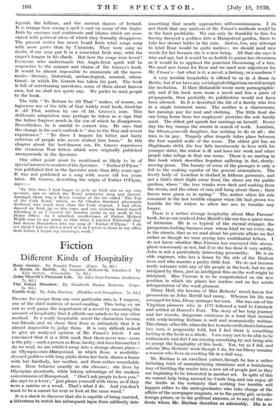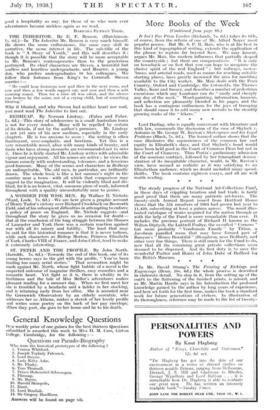Fiction
Different Kinds of Hospitality
Rose Anstey. By Ronald Fraser. (Cape. 7s. 6d.) A Room in Berlin. By Gunther Birkenfeld, translated by Eric Sutton. (Constable. 7s. 6d.) John Merrill's Pleasant Life. By Alice Beal Parsons. (Gollancz.
Is. 6d.) The Great Meadow. By Elizabeth Madox Roberts. (Cape.
7s. Oil.)
DESIRE for escape from our own particular ruts is, I suppose, one of the chief motives of novel-reading. This being so, we can as well gauge the importance of a novel by measuring the amount of hospitality that it affords our minds as by any other method. In a really hospitable novel the characters become our friends, and we share their lives so intimately that it is almost impossible to judge them. It is very difficult indeed to give an analysed opinion of Mr. Fraser's latest. I am convinced that it is a little mad, that there never was—more is the pity—such a person as Rose Anstey, but does this matter ? As we read, we arc whirled away into a strange dream place— an Olympus-cum-Hampstead, in which Rose, a modishly- dressed goddess with long plaits down her back, shares a house with her landlady, her mother, and three rather remarkable men. Rose behaves exactly as she chooses ; she lives by Olympian standards, while taking advantage of the modern conveniences of Hampstead. " Don't ask people to love you," she says to a lover ; " just please yourself with them, as if they were a sunrise or a wood. That's what I do. And you don't want to be a sunset for ever or look at the same wood."
It is a shock to discover that she is capable of being married, u bitterness to watch her subsequent lapse from sublimity into something that nearly approaches self-consciousness. I do not think that any analysis of Mr. Fraser's methods would be in the least profitable. We can only be thankful to him fur having decoyed a goddess into a Hampstead garden, there to take her shower baths in the rain. And so, too, any attempt to label Rose would be quite useless ; we should need new words for her because she is a new being. All that she says Is wise and apt, but it would be as foolish to praise her cleverness as it would be to applaud the punctual blossoming of a tree. We need new terms for Rose and we need new adjectives for Mr. Fraser's—but what is it, a novel, a fantasy, or a madness ?
A very terrible hospitality is offered to us in A Room in Berlin, but if we have any sociological obligations we will accept the invitation. If Herr Birkenfeld wrote more pornographic. ally and if his book were more a novel and less a piece of propaganda, then probably its publication would not have been allowed. In it is described the life of a family who live in a single tenement room. The mother is a charwoman; her earnings pay for rent and clothing. The little food she can bring home from her employers' provides the sole family meal. The eldest girl spends her earnings on herself. Every day the boy tramps the streets in search of work. Lenchen, the fifteen-year-old daughter, has nothing to do at all ; she tries to be gay. Tragedy after tragedy takes place between the four squalid walls of the room. The eldest girl has an illegitimate child, the boy falls incestuously in love with his younger sister, the widow is ill and loses her work and other people take refuge in that one room. There is no ranting in this book which describes hopeless suffering in flat, slowly- moving prose. The beauty of some of the passages is only a foil to the soaking squalor of the general atmosphere. The lovely body of Lenchen is clothed in hideous garments, and not a bird's short flight away from the slums are the public gardens, where " the tree trunks were dark and soaking from the storm, and the odour of rain still hung about them ; their leaves were green as in spring." The author offers his sole comment in the last terrible chapter when life bad grown too terrible for the widow to allow her son to breathe any longer.
There is a rather strange hospitality about Miss Parsons' book, for as one reads of John Merrill's life one has a queer sense of intrusion. He is so typical of the eternal stranger, the prosperous-looking business man whose kind we see every day in the streets, that as we read about his private affairs we feel rather as though we were prying into confidential letters. I do not know whether Miss Parsons has conveyed this atmos- phere consciously or not, but if so she has done it very subtly. John is not a particularly interesting personality. He is an able engineer, who has a house by the side of the Hudson river and who marries a pretty little fool. We do not become really intimate with any of the people in the book, but we are intrigued by them, just as intelligent flies on the wall might be intrigued. Miss Parsons is to be congratulated on the new position in which she places her readers and on her subtle interpretation of the word pleasant.
Diony Hall, the heroine of Miss Roberts' novel, has as few possessions as John Merrill had many. Whereas his life was arranged for him, Diony arranges her own. She was one of the Virginian pioneers who in 1777 followed a trail to Caintuck and settled at Harrod's Fort. The story of her long journey and her remote, dangerous existence in a land that teemed with scalp-hunting Indians is well and economically written. The climax of her life, when she has to make swift choice between two men, is poignantly told, but I feel there is something lacking in the book as a whole. I am sorry not to be able to be enthusiastic and feel I am missing something by not being able to accept the hospitality of this book. Yet, try as I did, and admire Miss Roberts' work though I do, for me Diony remains a woman who lives an exciting life in a dull way.
Mr. Buchan is an excellent yarner, though he has a rather irritating trick of manufacturing situations and a tantalising way of hurtling the reader into a new set of people just as they are beginning to be interested in another set. In spite of this we cannot help being amused by Castle Gay, and can enjoy all the thrills in the certainty that nothing too terrible will happen either to the undergraduates who take charge of the affairs of the newspaper magnate, or to the pretty girl, or to the foreign prince, or to his political enemies, or to any of the nice Scots whom Mr. Buchan describes so admirably- His is as
good a hospitality as any, for those of us who were ever adventurers become reckless again as we read.
BARBARA EUPHASI TODD.

















































 Previous page
Previous page